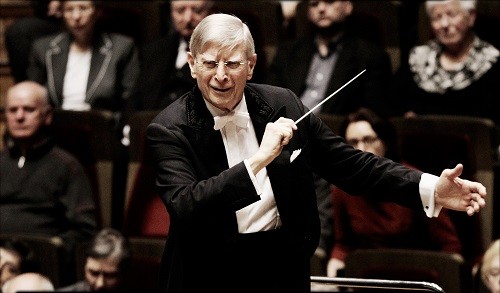 Switzerland Lucerne Festival, Bruckner: Gustav Mahler Jugendorchester, Herbert Blomstedt (conductor) Kultur- und Kongresszentrum Lucerne (KKL) 23.8.2015 (JR)
Switzerland Lucerne Festival, Bruckner: Gustav Mahler Jugendorchester, Herbert Blomstedt (conductor) Kultur- und Kongresszentrum Lucerne (KKL) 23.8.2015 (JR)

Bruckner: Symphony No. 8
The Gustav Mahler Jugendorchester was founded in Vienna in 1986/87 on the initiative of Claudio Abbado and is widely recognised as one of the finest youth orchestras around. It doesn’t only play Mahler of course but does specialise on the late Romantics. The original idea was to bring together young Austrian musicians (up to the age of 26) with young Czechs and Hungarians, at that time still part of the Eastern bloc. In 1992 the orchestra opened up to all Europeans. They are, for the most part, conservatoire undergraduates about to start their professional careers. 2,000 musicians audition every year, so competition is stiff (though 4,000 audition for the European Youth Orchestra). Looking down the names of the players, there is still a predominance of players from German-speaking countries (the Head Office of the orchestra is in Vienna) or from students of other nationalities at German Music schools.
It gladdened the soul to see so many clean-cut youngsters, sans headphones and torn jeans, soon ready to bolster the ranks of professional orchestras round Europe. I thought it was a pity that virtually all the violinists were women, though the men were well represented in all other sections.
Herbert Blomstedt has conducted the orchestra in 2008, 2010 and 2013 and is clearly a firm favourite with them. He is a staggering 88; he saunters onto the stage, conducts the symphony without a score, without needing a stool and hardly looks tired at the end of it all. He is somewhat of a Bruckner specialist, very much an “old hand”. He is clearly not authoritarian, but with white hair and bushy white eyebrows beams down from the podium at the massed youngsters like a benign old uncle. Blomstedt is a devout Seventh Day Adventist (he does not rehearse on the Sabbath – but can conduct performances which he regards as an expression of his religious devotion). No wonder, then, that he reveres Bruckner and it seems in particular, his Eighth symphony, which he conducted in a fine performance in Zurich a few years ago with the Tonhalle Orchestra. Unsurprisingly, he has not changed his interpretation.
Blomstedt chooses very steady tempi throughout the performance, no ungainly gear changes, no over-fussiness with individual notes; only in the Adagio does he almost become “schleppend” (contrary to Bruckner’s distinct instructions not to do so) in one or two places. He restrained the youthful orchestra when necessary and let them off the leash for the climaxes: Blomstedt gave clear entry signals, has a simple baton style, the orchestra were all eyes on their conductor.
At the outset of the work, the viola section impressed immediately with a rich, mellow tone. In the Scherzo the trumpets excelled, an especially fine quartet of players (two men, two women), crisp incisive playing: I was not surprised to read that two of them are being trained by Reinhold Friedrich at Karlsruhe’s Music College – Friedrich was the star of the show in the Mahler 5 under Nelsons and the Lucerne Festival Orchestra which I heard (and reviewed) last week. In the final movement, the opening was especially exhilarating.
Yes, there were tiny lapses in ensemble, the odd split note in the horns, a low timpani out of tune (which the timpanist quickly fixed) but nothing which doesn’t happen frequently in professional orchestras.
This concert occupied a Sunday morning slot before a whole day of Boulez. Sadly it did not fill the hall. Friends and parents appeared to be occupying many of the “cheap” seats as attested by the roars from the upper balconies at the end of the symphony and for each section as they stood to take their bows. Perhaps the final ounce of wonder and apocalypse was missing to show off the work’s grandeur – but overall this was a fine and very well-rehearsed performance of an utterly glorious symphony.
John Rhodes
